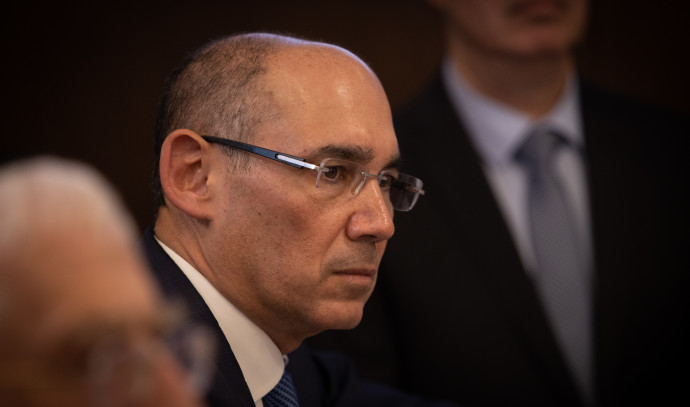In six months, Bank of Israel Governor Prof. Amir Yaron will end his five-year term of office. The global and Israeli economic landscape has changed completely since he entered office. Yaron has been through a global pandemic, high inflation, aggressive rate hikes that are still continuing and political pressure that none of his predecessors likely faced.
Yaron himself told Globes in an interview last month that he has not yet decided if he wants to seek a second term. But there is a growing feeling among market sources that he will not continue in the job, mainly due to the criticism that he has spoken of, even to the international media, about government policies and the damage caused by the judicial overhaul legislation. Even if he wanted to continue for another five-year term, he would need the approval of Prime Minister Benjamin Netanyahu and Minister of Finance Bezalel Smotrich, two people leading Israel’s economic policies, who have been criticized by Yaron.
Somebody who is expected to have a major say on the issue of the next governor is Netanyahu’s economic advisor Prof. Avi Simhon. It was Simhon who recommended Yaron to Netanyahu and then Minister of Finance Moshe Kahlon, and he is expected to be involved in deciding the identity of the next governor.
“A significant test case”
The political echelon insists, less than six months from the end of Yaron’s term, that they have not yet begun to deal with the question and the official process will only begin in 3-4 months. However, the decision regarding the continuation of Yaron’s position should be made in the near future, so that the process of identifying candidates can begin.
In light of the great uncertainty in the domestic market due to the planned changes in the judicial system, there are also those who think that the extension of Yaron’s tenure would send a message of calm to the markets, and remove the fear of interference with the independence of the Bank of Israel. Those who follow Israel’s economy closely are carefully scrutinizing the actions of the current government on the issue of the next governor.
“This is a very significant test case, and among the government’s most significant tests,” says a source in the financial world. “The markets will take a close look at the appointment and look to see what is wrong with it. If the government does not present an almost perfectly pure appointment, it could be dangerous for the markets. The fear and estimates that someone will not restrain themselves and introduce foreign considerations into the process is a serious concern.”
Another source in the financial world also points out the great sensitivity of the appointment, due to the situation created around the judicial overhaul. He mentions, among other things, the words of the governor, who recently specifically noted the damage caused by the planned judicial changes to the economy, such as the declaration that the reform has caused a 10% depreciation in the shekel exchange rate against the dollar, which he added has contributed to a 1% increase in inflation.
The source explains, “We heard the governor express himself in a very independent way and without fear of expressing an opinion. This is welcome and important but makes the appointment sensitive. If he does not continue, the departure may be perceived as an attempt to move him because of the criticism he leveled at the legislation, and then we will see a sharp reaction in the markets. If he continues, this will be good news.”
Who would be his replacement?
As for a possible replacement, the procedure is still in its early stages, but the limited time frame dedicated to finding a governor could make it difficult to fill the position. In recent years, it is common for governors to come from academia, with a doctorate or professorship. If Yaron does not stay for another term, the government probably intends to continue this custom.
In the market, it is estimated that an opinionated person would not be afraid to assume the position, even with the political background noise and even though the governor is often perceived by the public as the bad guy who hikes interest rates.
At the same time, one name in particular that stands out at the Bank of Israel is that of Deputy Governor Andrew Abir. “It is clear that someone like Andrew, a professional at the highest level, would be seen as a very strong appointment. The market knows him and knows that he will not let anyone bend him. He is a valued person that if the current governor does not continue, the markets would accept and love,” says a financial market source.
Not a new situation
A situation in which a governor leaves at the end of a first term, following criticism of the government’s economic policy, is nothing new. Yaron’s predecessor Karnit Flug did not stay for another term after criticizing Kahlon’s fiscal policy, mainly his flagship buyers price program for housing. Kahlon’s entourage conveyed messages that they would not extend Flug’s term, and she preempted the blow by sending a resolutely composed letter to Netanyahu, in which she announced that she would not seek another term.
Flug had become governor after Stanley Fischer stepped down, a situation that we may see again if Yaron does not win another term and does not choose a replacement until his retirement. Flug’s deputy Nadine Bodo-Trachtenberg also served as acting governor before Yaron’s appointment because of delays in the process.
In the current period, characterized by high uncertainty, not making a decision on an appointment could add fuel to the fire and increase economic damage. There is currently no regulated practice for the governor’s selection process, but the most recent appointments have proven that the people chosen were professional without political biases.



